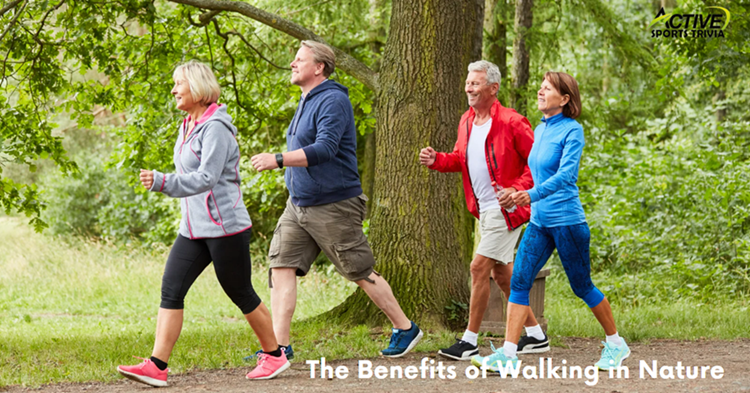Do you enjoy walking for exercise, relaxation, or exploration? If so, consider where you walk and how it affects your health and well-being. Walking in nature, such as in a park, a forest, or the countryside, has many benefits that walking in the city does not offer. In this article, I will explain why walking in nature is better than walking in the city and how you can make the most of your walks in natural settings.
Walking is one of the simplest and most accessible ways to stay fit and healthy. It can improve cardiovascular health, lower blood pressure, regulate blood sugar, strengthen bones and muscles, and burn calories. It can also boost your mood, reduce stress and anxiety, enhance your creativity, and improve your memory and attention span. However, not all walks are created equal. The environment in which you walk can have a significant impact on the quality and quantity of your walking experience.
The Benefits of Walking in Nature
Walking in nature has many advantages over walking in the city. Here are some of the benefits of walking in nature, backed by scientific research:
- Cleaner air. Air pollution is a major health hazard in urban areas, especially for people with respiratory conditions such as asthma or allergies. Air pollution can trigger inflammation, impair lung function, and increase the risk of chronic diseases and cancers. Walking in nature can expose you to fresher and cleaner air, which can improve your breathing and reduce your exposure to harmful pollutants. One study found that women who lived in greener neighborhoods had a 34 percent lower risk of dying from respiratory diseases than those who lived in less green areas.
- Better sleep. Sunlight is essential for regulating your circadian rhythm, which is your body’s natural clock that tells you when to feel awake or sleepy. Sunlight can help you feel more alert during the day and more tired at night, which can improve your sleep quality and duration. Walking in nature can expose you to more sunlight than walking in the city, especially if you walk in the morning or afternoon. One study found that people who spent at least 120 minutes per week in nature reported better sleep than those who spent less or no time in nature.
- Reduced depression. Depression is a common mental health problem that affects millions of people worldwide. Depression can cause low mood, loss of interest, fatigue, insomnia, and suicidal thoughts. Walking in nature can help reduce depression symptoms by stimulating the production of serotonin, a neurotransmitter that regulates mood, appetite, and sleep. Walking in nature can also provide a sense of awe, wonder, and gratitude, which can counteract negative emotions and thoughts. One study found that people who walked in a natural setting for 90 minutes reported lower levels of rumination, and a tendency to dwell on negative aspects of themselves, than those who walked in an urban setting.
- Motivation to exercise. Walking in nature can make you more likely to walk longer and more often than walking in the city. This is because walking in nature can be more enjoyable, rewarding, and satisfying than walking in the city. Walking in nature can also provide more variety, challenge, and novelty, which can keep you interested and engaged. One study found that people who walked in a natural setting for 50 minutes felt more positive and energized than those who walked in an urban setting for the same duration.
- Mental energy. Walking in nature can boost your mental energy by reducing mental fatigue and restoring your attention and focus. Mental fatigue can result from prolonged or demanding cognitive tasks, such as working, studying, or multitasking. Mental fatigue can impair your performance, concentration, and decision-making. Walking in nature can help you recover from mental fatigue by providing a relaxing and stimulating environment that can distract you from your worries and refresh your mind. One study found that people who walked in a park for 20 minutes performed better on a memory and attention test than those who walked in a city street or watched a video of the same environment.
The Disadvantages of Walking in the City
Walking in the city has some drawbacks that can limit or negate the benefits of walking. Here are some of the disadvantages of walking in the city, based on scientific evidence:
- Noise pollution. Noise pollution is a common problem in urban areas, caused by traffic, construction, sirens, alarms, or other sources of loud and unwanted sounds. Noise pollution can interfere with your hearing, communication, and relaxation. It can also increase your stress, blood pressure, and heart rate, and impair your cognitive function and mood. Walking in the city can expose you to high levels of noise pollution, which can reduce the quality and enjoyment of your walk. One study found that people who walked in a noisy street reported lower levels of well-being and higher levels of annoyance than those who walked in a quiet park.
- Traffic hazards. Traffic hazards are another risk factor in urban areas, especially for pedestrians. Traffic hazards can include speeding vehicles, distracted drivers, poor visibility, or lack of crosswalks or sidewalks. Traffic hazards can endanger your safety and increase your chances of getting injured or killed by a collision. Walking in the city can expose you to traffic hazards, which can make you more alert and anxious, and less relaxed and comfortable. One study found that people who walked on a busy street had higher levels of cortisol, a stress hormone, than those who walked in a calm park.
- Lack of greenery. Greenery is the presence of plants, trees, grass, or other forms of vegetation in an environment. Greenery can have positive effects on your health and well-being, such as improving your air quality, cooling your temperature, enhancing your aesthetics, and supporting your biodiversity. Walking in the city can deprive you of greenery, which can make your walk less pleasant and beneficial. One study found that people who walked in a green space had lower levels of inflammation and higher levels of immune function than those who walked in a non-green space.
How to Make the Most of Your Walks in Nature
Walking in nature is better than walking in the city, but how can you make the most of your walks in nature? Here are some tips to help you optimize your walking experience in natural settings:
- Choose a suitable location. The location of your walk can affect your experience and outcome. Choose a location that suits your preferences, needs, and goals. For example, if you want to relax and unwind, choose a location that is quiet, peaceful, and scenic. If you want to challenge yourself and improve your fitness, choose a location that is hilly, rocky, or uneven. If you want to explore and learn, choose a location that is diverse, rich, and unfamiliar.
- Plan ahead. Planning ahead can help you prepare for your walk and avoid potential problems. Check the weather forecast, the trail conditions, and the opening hours of your destination. Dress appropriately, wear comfortable shoes, and bring water, snacks, sunscreen, and a map. Tell someone where you are going and when you expect to return. Follow the rules and regulations of your destination, and respect the wildlife and the environment.
- Be mindful. Being mindful can help you enjoy your walk and reap the benefits of walking in nature. Being mindful means paying attention to the present moment, without judging or reacting. Notice your surroundings, your sensations, your thoughts, and your emotions. Appreciate the beauty, the diversity, and the complexity of nature. Connect with yourself, with nature, and with others. Breathe deeply, relax, and have fun.
Walking in nature is better than walking in the city
Walking is a great way to stay healthy and happy, but where you walk matters. Walking in nature is better than walking in the city, because it can provide you with cleaner air, better sleep, reduced depression, motivation to exercise, and mental energy. Walking in the city, on the other hand, can expose you to noise pollution, traffic hazards, and lack of greenery, which can limit or negate the benefits of walking. To make the most of your walks in nature, choose a suitable location, plan ahead, and be mindful. By walking in nature, you can improve your physical, emotional, and mental health, and enjoy the wonders of the natural world.



